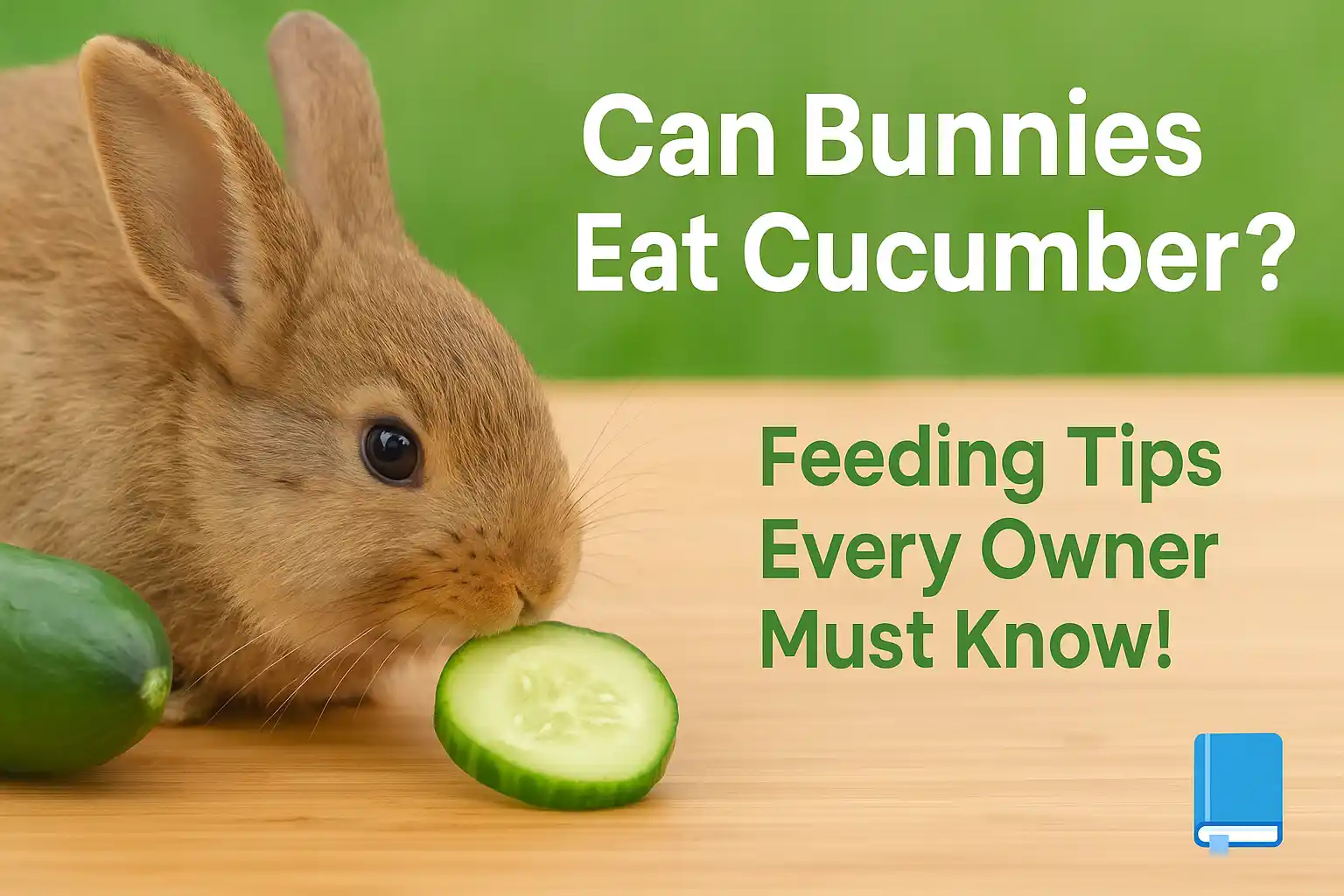As a pet health specialist with over 15 years of experience working with rabbits, I’ve fielded countless questions about safe foods for these sensitive pets. Among the most common queries is whether can bunnies eat cucumber safely. This refreshing vegetable is popular among owners looking to add variety to their pets’ diets, but proper knowledge is essential to feed it correctly. If you’re wondering ‘can bunnies eat cucumber’ as part of a varied diet, the answer is yes – with some important considerations.
Rabbits have delicate digestive systems that require careful dietary management. Understanding how cucumber fits into a healthy rabbit diet is crucial for preventing health issues and ensuring your bunny thrives. Let’s explore everything you need to know about feeding cucumber to your rabbit companion.
Key Answer: Can Bunnies Eat Cucumber?
Yes, bunnies can eat cucumber safely when offered in appropriate amounts. Cucumber should be considered an occasional treat rather than a dietary staple due to its high water content and relatively low nutritional value. For a medium-sized rabbit (4-7 pounds), the appropriate serving is 1-2 thin slices of cucumber (about ¼ inch thick) offered 2-3 times weekly. Both the flesh and skin are safe for rabbits to consume if thoroughly washed to remove pesticides. Always introduce cucumber gradually and monitor your bunny for any signs of digestive upset.
Table of Contents
ToggleUnderstanding Cucumber and Its Nutritional Value for Bunnies
Cucumbers are composed primarily of water—about 95% to be exact. This high water content makes cucumber a refreshing treat for bunnies, especially during warmer months when hydration is particularly important. When pet owners ask me ‘can bunnies eat cucumber safely’, I explain that the nutritional profile is important to understand.
The nutritional profile of cucumber includes:
- Very low calorie (about 15 calories per 100g)
- Low sugar content
- Small amounts of vitamins A, K, and C
- Trace minerals including potassium and magnesium
- High water content (95%)
- Minimal fiber
From my years treating rabbits, I’ve observed that while can bunnies eat cucumber as an occasional treat, it shouldn’t replace more nutritious vegetables. The low fiber and minimal nutritional density make cucumber less valuable than leafy greens like romaine lettuce, kale, or herbs which should form the backbone of your bunny’s fresh food intake.
In my practice at pets health, I’ve found that integrating small amounts of cucumber into a well-balanced diet can provide beneficial variety and hydration for rabbits, particularly during hot weather.
Can All Types of Cucumber Be Fed to Bunnies?
Not all cucumbers are created equal when it comes to rabbit consumption. Through my practice, I’ve developed specific recommendations about cucumber varieties for rabbits. When owners ask can bunnies eat cucumber of any variety, I advise caution.
Regular slicing cucumbers (the common grocery store variety) are generally safe for bunnies when properly prepared. English cucumbers, with their thinner skin and fewer seeds, can be slightly easier for rabbits to digest. However, pickled cucumbers or any cucumber prepared with salt, vinegar, or spices should never be offered to your bunny.
When preparing cucumber for your rabbit, I always advise my clients to:
- Choose organic cucumbers when possible to minimize pesticide exposure
- Wash thoroughly to remove any residual chemicals
- Remove the seeds if feeding larger quantities (though a few seeds are typically fine)
- Cut into appropriately sized pieces to prevent choking
In my clinic, I’ve treated rabbits who experienced digestive upset from eating cucumber skins with heavy wax coatings or pesticide residue. When in doubt, peeling the cucumber ensures you’re only feeding the safest part to your bunny.
For more detailed guidance on introducing new foods to your rabbit’s diet, check out my article on Can Rabbits Eat Strawberries.
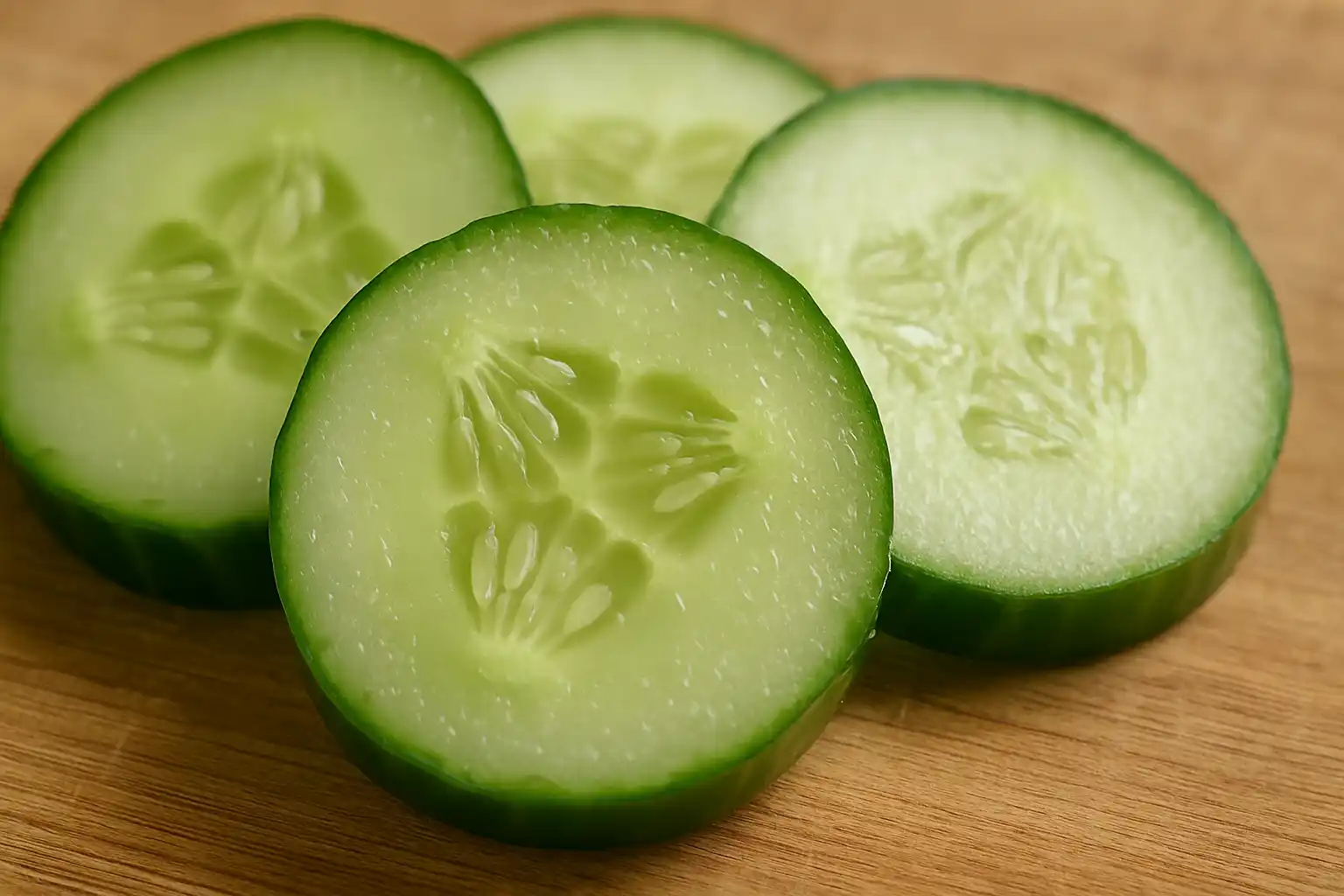
Health Benefits of Cucumber for Rabbits
While cucumber isn’t nutritionally dense, it does offer several benefits for bunnies when fed appropriately. The high water content makes cucumber an excellent hydration source, especially for rabbits who don’t drink adequate water. Many rabbit owners wonder ‘can bunnies eat cucumber for hydration?’ and the answer is yes – the high water content makes it excellent for summer months.
During my years of practice, I’ve recommended cucumber as a supplemental hydration source for rabbits recovering from minor digestive upsets or those needing extra fluids during hot weather. The cooling effect can help prevent heat stress, which rabbits are particularly susceptible to.
Additionally, the crunchy texture of cucumber provides a form of environmental enrichment. Can bunnies eat cucumber for mental stimulation? Absolutely. Rabbits naturally enjoy the sensation of crunching through fresh vegetables, which mimics their natural foraging behavior. I’ve observed many rabbits who become noticeably more active and engaged when offered fresh cucumber to explore and eat.
Though can bunnies eat cucumber safely in moderation, remember it should complement—never replace—their primary diet of unlimited high-quality hay and limited pellets.
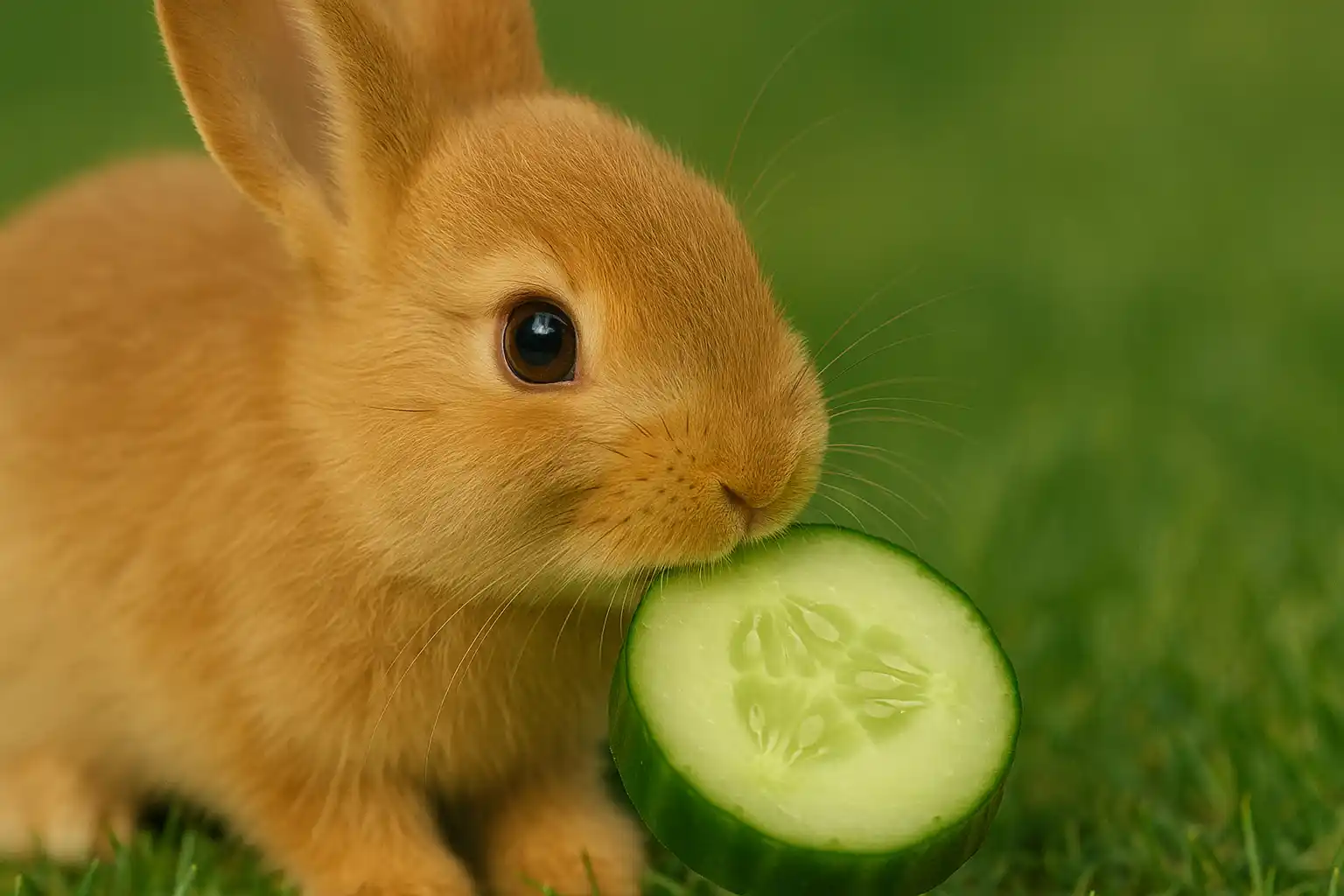
Potential Risks of Feeding Cucumber to Bunnies
Despite being generally safe, cucumber does present some potential risks for rabbits when fed inappropriately. As a veterinary professional who’s treated many cases of rabbit digestive issues, I want to highlight the most common concerns when considering can bunnies eat cucumber without problems:
Digestive disturbances are the primary risk. Cucumbers contain mostly water with minimal fiber, which can potentially disrupt the delicate balance of bacteria in a rabbit’s gut if fed in excess. I’ve treated numerous cases of soft stool or diarrhea resulting from overzealous cucumber feeding.
The high water content can also occasionally lead to bloating or gas when bunnies consume too much cucumber at once. This is particularly true for rabbits not accustomed to fresh vegetables or those with sensitive digestive systems.
Another consideration is nutritional balance. When bunnies fill up on watery vegetables like cucumber, they may consume less hay, which is absolutely essential for proper digestion and dental health. This is what veterinarians call “empty calories” – taking up stomach space without providing significant nutrition.
In my clinical experience, most cucumber-related issues resolve quickly once feeding is adjusted appropriately, but prevention is always preferable to treatment.
How to Safely Introduce Cucumber into a Bunny’s Diet
Proper introduction of cucumber to your bunny’s diet is crucial for preventing digestive upset. Based on my experience working with thousands of rabbits, here’s my recommended approach:
Start extremely small—about the size of a nickel or smaller—especially if your bunny has never had cucumber before. Watch carefully for any changes in stool consistency, appetite, or behavior over the next 24 hours before offering more. When introducing cucumber, owners often ask ‘can bunnies eat cucumber immediately?’ but a gradual approach is essential.
Gradually increase the amount if no adverse reactions occur. For an average-sized rabbit (4-6 pounds), a few thin slices of cucumber 2-3 times per week is generally appropriate. Larger rabbits can handle slightly more, while dwarf breeds should receive less.
Never introduce cucumber simultaneously with other new foods. This makes it impossible to identify the culprit if digestive issues develop. Can bunnies eat cucumber alongside other new vegetables? I always tell my clients: “One new food at a time, with at least 3 days between introductions.”
In my practice, I’ve found that rabbits with pre-existing digestive sensitivities may need even more gradual introduction. For these bunnies, starting with just a tiny corner of cucumber and monitoring carefully is the safest approach.
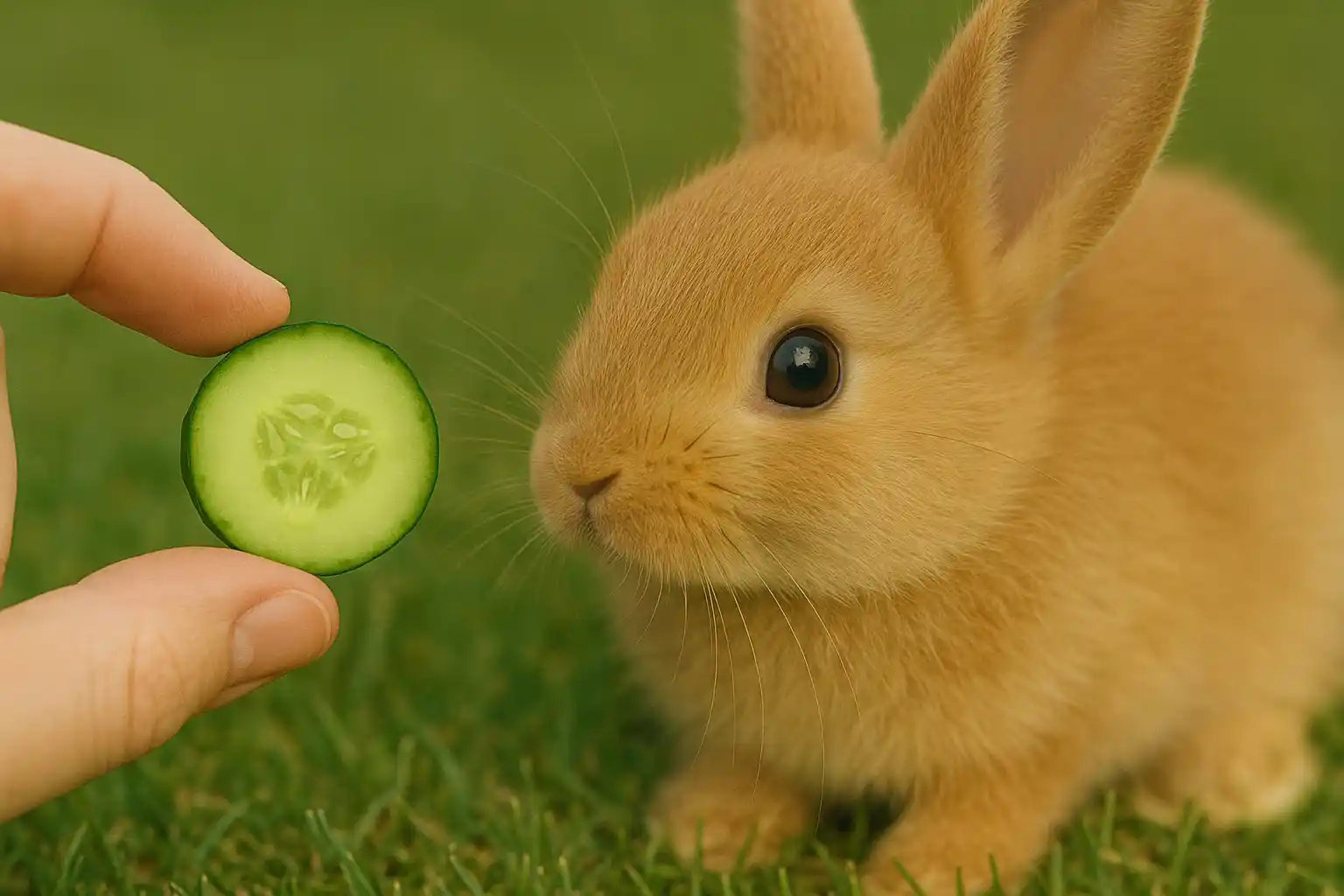
Comparison of Cucumber with Other Vegetables for Rabbits
When evaluating whether can bunnies eat cucumber compared to other vegetables, it’s important to consider nutritional density and fiber content. From my professional experience, I classify vegetables for rabbits into three categories:
Daily Staples (High Nutritional Value):
- Romaine lettuce
- Cilantro
- Parsley
- Carrot tops
- Kale (in moderation)
- Bok choy
Moderate Nutritional Value (Feed 2-3 Times Weekly):
- Bell peppers
- Zucchini
- Broccoli leaves
Treat Category (Lower Nutritional Value):
- Cucumber
- Iceberg lettuce
- Carrot (high sugar)
Compared to more nutritious vegetables, cucumber offers significantly less fiber and fewer micronutrients. I always recommend that cucumber make up no more than 10-15% of a rabbit’s daily vegetable allowance, with the remainder consisting of leafy greens and herbs.
When comparing vegetables, it’s important to consider where cucumber fits. Can bunnies eat cucumber as often as leafy greens? No, cucumber should be offered less frequently than nutritionally dense options.
In my rabbit nutrition seminars, I emphasize that variety is key. Rotating through different vegetables ensures your rabbit receives a diverse array of nutrients while preventing selective eating habits. If you’re feeding cucumber, balance it with more nutritionally complete options like romaine, herbs, or bell peppers.
Recommended Serving Sizes of Cucumber for Bunnies
Appropriate serving sizes depend primarily on your rabbit’s weight, age, and individual tolerance. Based on my clinical experience, here are my general recommendations:
For a 3-4 pound dwarf rabbit: No more than one 1/4-inch slice of cucumber 2-3 times weekly.
For a 5-7 pound medium rabbit: One to two 1/4-inch slices of cucumber 2-3 times weekly.
For a 9+ pound large rabbit: Up to three 1/4-inch slices of cucumber 2-3 times weekly.
A common question is ‘can bunnies eat cucumber daily?’ but I recommend limiting it to 2-3 times weekly to prevent digestive upset and ensure nutritional balance.
Young rabbits under 6 months should receive even smaller amounts as their digestive systems are still developing. Can bunnies eat cucumber when they’re young? I’ve found that juvenile rabbits are particularly prone to digestive upset from watery vegetables like cucumber, so extra caution is warranted.
Elderly rabbits or those with chronic digestive issues may need reduced portions as well. I’ve worked with many senior rabbits who simply cannot tolerate the same amount of fresh food they enjoyed in their younger years.
Remember that these guidelines address the question “can bunnies eat cucumber” in terms of quantity, but individual variation exists. Always observe your specific rabbit’s response and adjust accordingly.
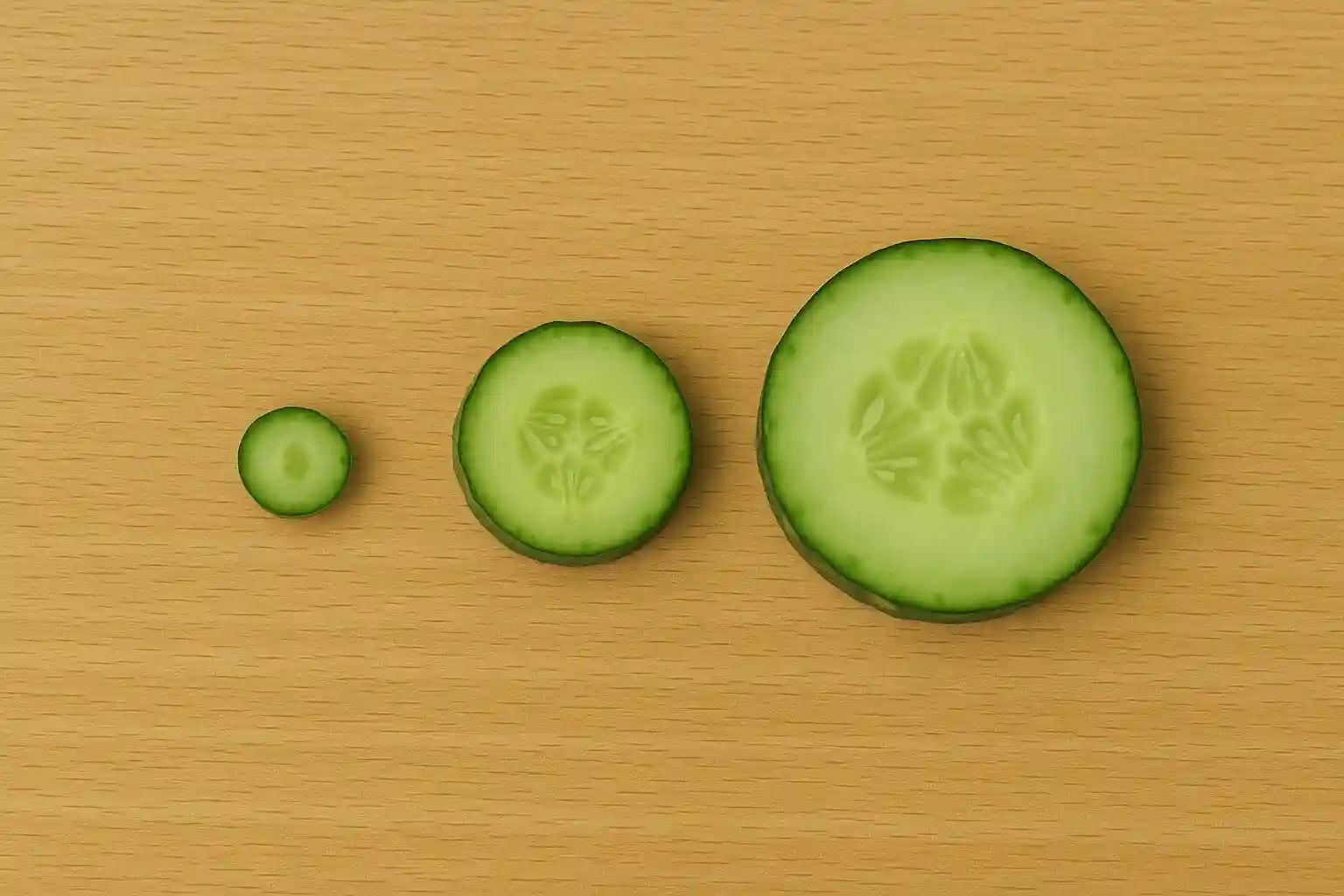
Signs of Cucumber-Induced Gastrointestinal Issues in Bunnies
Throughout my veterinary career, I’ve treated numerous cases of digestive upset related to inappropriate cucumber feeding. Being vigilant for early warning signs can prevent more serious complications. Recognizing if your rabbit is having trouble with cucumber is crucial. If you’ve been asking ‘can bunnies eat cucumber without issues?’, watch for these warning signs:
Early Warning Signs:
- Soft, misshapen droppings (not perfect round pellets)
- Decreased appetite for hay
- Reduced overall activity
- Slightly wet fur around the mouth or chin from excessive drooling
More Serious Symptoms:
- Diarrhea or very soft stool
- Complete refusal to eat hay or pellets
- Bloated appearance or visible discomfort
- Grinding teeth (a sign of pain)
- Hunched posture
- Complete cessation of droppings
In my practice, I’ve observed that most mild cases resolve within 24-48 hours after eliminating cucumber and all other fresh foods while maintaining unlimited hay access. However, if your bunny shows no improvement within 12 hours or exhibits severe symptoms, veterinary attention is crucial.
According to the AVMA, rabbits can deteriorate quickly when experiencing gastrointestinal stasis, making prompt treatment essential.
Expert Recommendations on Feeding Cucumber to Bunnies
After consulting with both The House Rabbit Society and drawing from my own extensive clinical experience, I’ve developed these expert recommendations regarding whether can bunnies eat cucumber:
Cucumber should always be considered a supplementary treat, not a dietary staple. The foundation of every rabbit’s diet must remain unlimited high-quality grass hay, supplemented with a measured amount of pellets and a variety of leafy greens.
When feeding cucumber, remember these key principles:
- Offer only fresh, thoroughly washed cucumber
- Remove seeds when feeding larger amounts
- Cut into appropriate sizes to prevent choking
- Never feed pickled or seasoned cucumber
- Limit to no more than 10% of the daily fresh food allowance
For optimal nutritional balance, I recommend pairing cucumber with more nutritious vegetables. For example, if offering cucumber, ensure the majority of your rabbit’s vegetable allowance that day consists of items like romaine lettuce, herbs, or bell peppers.
In my years of practice, I’ve found that this balanced approach allows rabbits to enjoy cucumber as an occasional treat while maintaining optimal digestive and overall health.
Common Myths About Bunnies and Cucumber Consumption
Throughout my career, I’ve encountered numerous misconceptions about feeding cucumber to rabbits. Let me address the most common myths I hear when owners ask can bunnies eat cucumber:
Myth 1: Cucumber causes immediate diarrhea in all rabbits. Reality: While excessive cucumber can cause digestive upset, most rabbits can tolerate small amounts without issue when properly introduced. Individual sensitivity varies significantly.
Myth 2: The seeds in cucumber are toxic to rabbits. Reality: Cucumber seeds are not toxic, though they provide minimal nutritional value. For sensitive rabbits, removing seeds can reduce the risk of digestive upset, but a few seeds are generally harmless.
Myth 3: Cucumber skin is dangerous for rabbits. Reality: The skin itself isn’t inherently harmful, but potential pesticide residue or wax coatings might be. I recommend thorough washing or peeling for conventionally grown cucumbers.
Myth 4: Rabbits can live on cucumber and lettuce alone. Reality: This is dangerously false. Rabbits require primarily hay, with cucumber being only an occasional treat. A diet centered around cucumber would cause severe malnutrition.
Myth 5: Wild rabbits commonly eat cucumber, so domestic rabbits should too. Reality: Wild rabbits primarily consume grasses and herbs, rarely encountering cucumbers. Domestic rabbits’ diets should mimic wild rabbits’ natural foraging patterns, focusing on high-fiber foods.
Understanding these facts helps answer the question “can bunnies eat cucumber” with appropriate context and safety considerations.
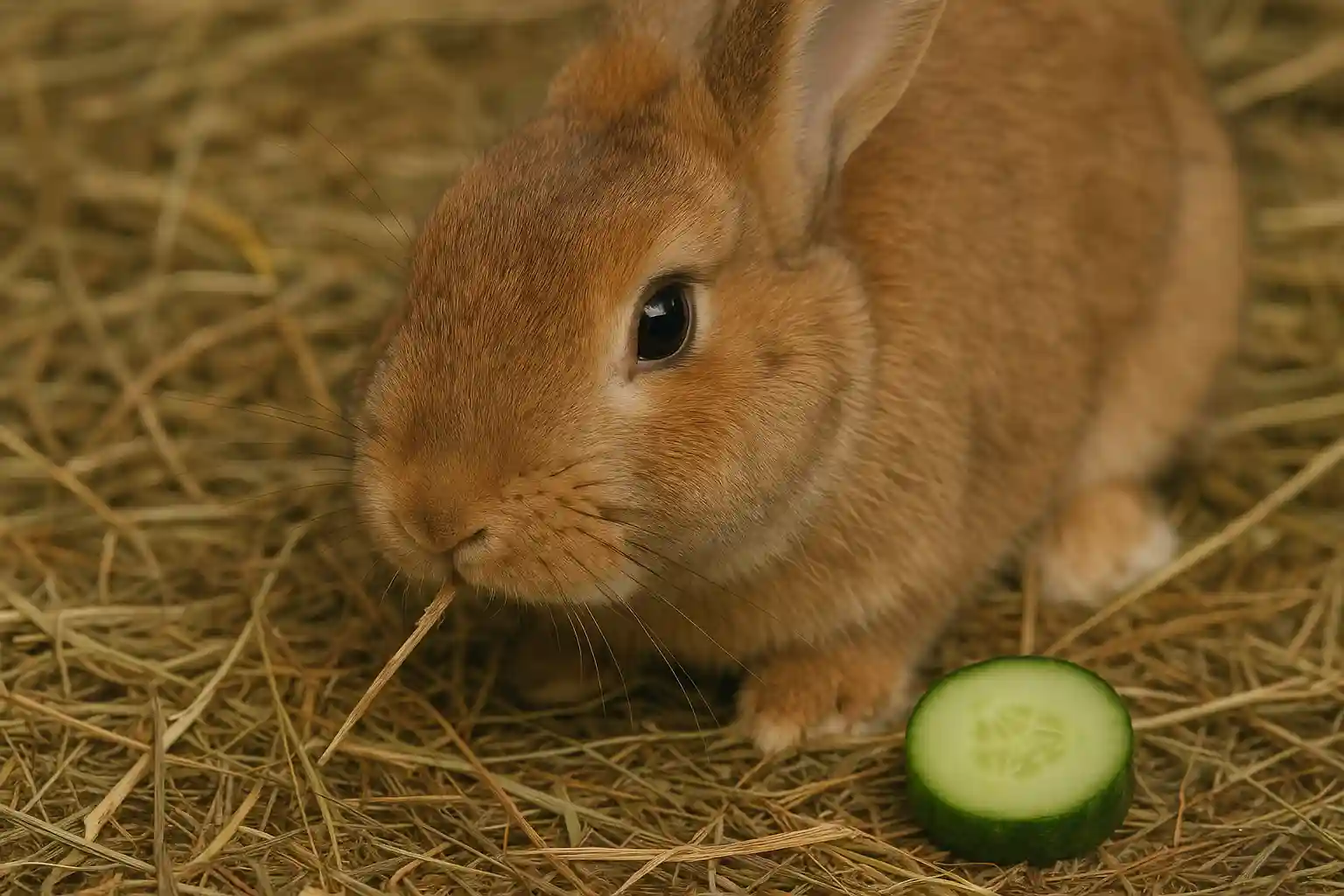
Conclusion
To definitively answer the question “can bunnies eat cucumber?” – yes, rabbits can safely consume cucumber as an occasional treat when offered appropriately. The key is moderation, proper preparation, and careful introduction.
From my 15 years of experience working with rabbits, I’ve found that cucumber can be a refreshing and enjoyable addition to a balanced rabbit diet, particularly during warmer months when extra hydration is beneficial. However, it should never replace the essential components of a rabbit’s diet: unlimited high-quality hay, measured pellets, and a variety of leafy greens.
Always observe your individual rabbit’s response to cucumber, as sensitivity varies between animals. When in doubt, consult with a rabbit-savvy veterinarian who can provide guidance specific to your pet’s needs.
Remember that dietary excellence is one of the most important factors in ensuring a long, healthy life for your bunny companion. By understanding how to properly incorporate treats like cucumber, you’re taking an important step toward providing optimal care for your rabbit.
FAQs About Bunnies Eating Cucumber
Are rabbits allergic to cucumbers?
True cucumber allergies in rabbits are extremely rare. What many owners mistake for allergies are actually digestive sensitivities caused by introducing cucumber too quickly or feeding excessive amounts. If your rabbit shows symptoms like sneezing, eye discharge, or skin irritation after eating cucumber, consult your veterinarian immediately, as these could indicate either a rare cucumber sensitivity or an unrelated health issue.
How many cucumbers can I give my bunny?
For a medium-sized rabbit (5-7 pounds), limit cucumber to 1-2 thin slices (¼ inch thick) 2-3 times weekly. Small breeds should receive half this amount, while larger breeds can have slightly more. Always prioritize nutritionally dense vegetables, keeping cucumber to less than 10% of their fresh food intake. Monitor your bunny’s droppings to ensure the amount isn’t causing digestive upset.
Can rabbits eat mango?
Rabbits can eat very small amounts of mango as an occasional treat due to its high sugar content. Limit serving size to a ½-inch cube once weekly for medium rabbits. Always remove the pit and peel, which can be choking hazards. Introduce mango gradually and monitor for digestive upset. Many rabbits cannot tolerate even small amounts of fruit, so observe yours carefully after offering mango.
Can rabbits eat corn?
Rabbits should not eat corn in any form. Corn kernels are difficult for rabbits to digest and can cause dangerous intestinal blockages. The high starch content can disrupt gut flora and potentially lead to GI stasis. Neither fresh corn, dried corn, corn husks, nor corn plants are safe for rabbit consumption. Instead, offer safe vegetables like romaine lettuce, bell peppers, and herbs for dietary variety.

